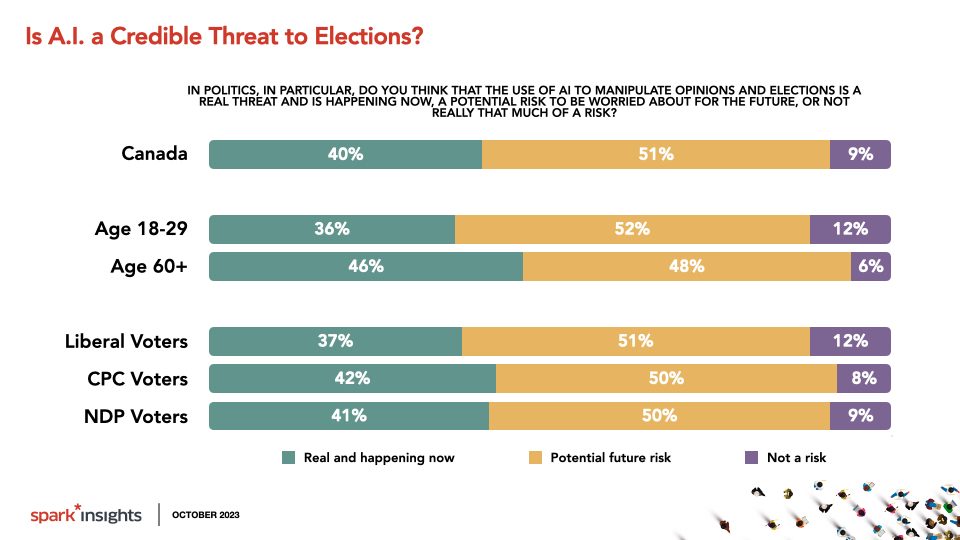Subscribe for more!
Subscribe to our newsletter for insights and articles on wide ranging issues including reputation management, branding, advertising, awareness, advocacy, and communications. You can unsubscribe anytime.
Follow us on social:

Fresh research by spark*insights reveals Canadians are divided about the benefits and drawbacks of Artificial Intelligence (AI) on society, and worried about the impact on democracy. Here’s what we found:
Cover: Imagery depicting AI, generated by AI.

While Canadians have a mixed opinion on this question, Americans have significant concerns. A recent PEW Research survey found 52% of Americans are more concerned than excited about the increased use of AI in daily life, with only 10% saying they are more excited than concerned. The same poll found Americans are more concerned their government won’t go far enough in their regulations of AI (67%) than will go too far (31%).
AI generated content recently made an appearance in the U.S. presidential race with Governor Ron DeSantis releasing a video using the technology to depict former President Trump hugging Dr. Anthony Fauci, and North of the border, Anthony Furey received attention for using AI generated images in his Toronto mayoral platform.
Recent elections in Argentina may be the first large scale use of AI, and demonstrate some of the risks that the technology can be used to manipulate public opinion and the media.
Concerns that AI will make it easy for nefarious actors to mislead voters with deep-fake videos and misinformation have led governments to take action, including the Canadian federal government which has already begun with an voluntary code of conduct and proposed legislation to impose formal regulations on the new technology within Canadian borders.

Bruce Anderson, Partner and Chief Strategy Officer of spark*advocacy: “Few technologies have the ability to prompt hope and fear in such large measure. It’s too early for most people to have a firm, developed understanding of the upsides and downsides of AI, but not too early for them to worry about what could go awry, without some rules and parameters around the use of AI.”
Alex Kohut, Senior Director of spark*insights: “While it’s undeniable that AI will lead to quality-of-life improvements for Canadians – possibly including helping us write our survey releases – Canadians are aware of the threat of this technology being used to misinform and manipulate. In a world where democracies are already facing many threats, Canadians are going to want governments to be proactive and prepare to mitigate the inevitable dangers the technology will pose as it evolves.”
Perry Tsergas, President & CEO of spark*advocacy: “What we are seeing now with the nascent use of AI in politics has similarities to what the televised Nixon vs. Kennedy U.S. presidential debate, or the early days of social media felt like; a sea change. Canadians understand the risks to not just our democracy, but democracies everywhere. With 40% of Canadians of the belief that AI is being used to manipulate opinions and elections, and another 51% concerned about future risks, there is an urgent need for governments and technology companies to come together to put in place guardrails for safeguarding our democratic institutions. Important work is being done on issues related to disclosures when AI is used, digital watermarking (content providence) and public literacy. However, that work needs to be done with greater speed, and across more jurisdictions."
ChatGPT, after being shown the data: “The overwhelming consensus on AI’s potential threat to elections, especially among seniors, underscores a shared apprehension about the technology’s influence on democratic processes, hinting at the need for comprehensive public discourse and regulatory measures in the future.”
Survey details: October 10-15 online, 2,000 cases nationwide in Canada. For more information about spark*advocacy or our spark*insight research offering feel free to reach out to bruce@sparkadvocacy.ca or alex@sparkadvocacy.ca.
spark*insights is led by Bruce Anderson, one of Canada’s leading and most experienced public opinion researchers. From polling and research to analysis and guidance, we help organizations, uncover the factors driving or influencing public perception to gain valuable insights into the shape and movement of the landscape.